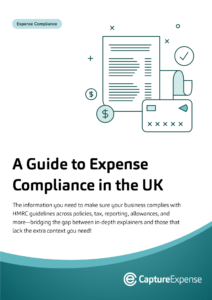Imagine this; you’re a project manager heading to Edinburgh for an important business meeting. You’ve booked a train, lined up your hotel stay, and are preparing to grab meals on the go.
These are all necessary expenses for your trip. But did you know that in the UK, you might be able to claim these costs back under what’s called a “subsistence allowance”?
Whether you’re footing the bill yourself or your company is reimbursing you, it’s important to understand what qualifies as a legitimate business expense and how to claim it properly.
Let’s get you ready for your next business trip by breaking down the key things you need to know about subsistence allowance in the UK. From what’s included to what’s not, and how to report a claim, we’ve got you covered—so you can focus on your work without worrying about out-of-pocket expenses.
What is a subsistence allowance in the UK?
Subsistence allowance in the UK refers to expenses that employees can claim for costs incurred while traveling for work, such as meals, accommodation, and travel.
HM Revenue and Customs (HMRC) allows these claims to cover necessary, business-related expenses, provided they meet specific guidelines and are not part of the employee’s regular, everyday costs.
When can you claim subsistence allowance in the UK?
Let’s stick with the same example as before. As a project manager, your job involves travelling to meet clients across the UK.
One day, you have a meeting scheduled in Manchester, (your usual office is in Birmingham). To make it to your meeting on time, you catch an early train, grab breakfast on the go, and then later buy lunch while you’re in Manchester before heading back.
Now, can you claim these food expenses as a subsistence allowance? Yes, in this scenario, you likely can!
Here’s why:
- The expense is necessary for your work duties: travelling to Manchester is part of your job responsibilities, so any reasonable costs incurred while doing this are necessary for work.
- It’s an additional cost: if you hadn’t been travelling for work, you wouldn’t have had to spend extra money on breakfast and lunch in a different city. These are costs over and above your usual daily expenses.
- You have receipts: always keep your receipts. Whether it’s a coffee shop receipt for breakfast or a restaurant bill for lunch, they’re essential to verify your claim.
- You’re away from your usual place of work: since you’re not working from your Birmingham office and had to travel to Manchester, these expenses fall under the criteria of being away from your normal workplace.
It’s important to note that the costs you claim must be reasonable. For instance, a modest lunch in Manchester would be acceptable, but a lavish dinner at a high-end restaurant might raise eyebrows with HMRC.
Are there any exceptions?
Yes. Here are some examples of situations where you might be exempt from claiming a subsistence allowance in the UK:
- When your employer provides meals (during the trip)
- When the trip is for personal reasons (even if there’s a minor business component)
- When the expenses are excessive

Get the latest insights and product updates, direct to your inbox.
The subsistence allowance rates in the UK
Here are HMRC’s daily subsistence allowance rates in the UK for 2025:
Meal subsistence rates in the UK
| Employee subsistence rate | Maximum limit |
| One meal (5 hour) ceiling | £5 |
| Two meal (10 hour) ceiling | £10 |
| Three meal (12 hour) ceiling | £15 |
| 24-hour ceiling | £25 |
Accommodation rates in the UK
| Location | Maximum limit |
| London | £130 |
| Bristol | £100 |
| Warrington | £90 |
| Reading | £85 |
| All other locations (UK based) | £75 |
What about mileage rates?
While your employees can’t claim back the actual hours they spend driving for work, they can claim mileage allowance to cover the costs of using their own vehicle. HMRC’s mileage allowance rates are designed to compensate for fuel, wear and tear, and other expenses, helping employees offset the costs of business travel.
Here are the approved mileage rates for 2025:
| Type of vehicle | 10,000 miles | 10,000 + miles |
| Cars and vans | 45p | 25p |
| Motorcycles | 24p | 24p |
| Bikes | 20p | 20p |
The subsistence allowance rates outside the UK
If you’re travelling abroad for work, HMRC provides subsistence rates in local currencies for different countries and cities.
Here are some of the most popular destinations in 2025:
| Country | Expense | Rates |
| United States | Meals | $21 – $34.50 |
| Accommodation | $216 – $239 | |
| Canada | Meals | $38.50 – $47 |
| Accommodation | up to $224 | |
| European countries | Meals | €22 – €40 |
| Accommodation | averages €199.50 | |
| Singapore | Meals | SGD 91.50 |
| Accommodation | SGD 318 | |
| Hong Kong | Meals | HKD 292.50 |
| Accommodation | HKD 2376.50 |
How to report subsistence allowance spending to HMRC
Reporting subsistence allowance to HMRC is fairly straightforward and follows the same process as reporting other work-related expenses.
At the end of the tax year, you need to complete a P11D form for each employee who received reimbursements for expenses (like meal allowances). Additionally, a P11D(b) form may be required to summarise the total expenses and calculate any necessary Class 1A National Insurance contributions.
It’s also worth noting that from April 2026, all benefits in kind (BIK)—except for loans and living accommodation—must be reported and taxed through payroll. Which means that you’ll no longer be able to process BIKs through P11Ds.
To make sure everything runs smoothly, you should have a clear process in place for collecting, verifying, and recording your expenses.
Say hello to Capture Expense
Want to keep all your expenses, including subsistence allowance in the UK, organised and in one place?
Book a demo with Capture Expense today and see how easy it is to submit, track, and manage your expenses—saving you time and keeping you compliant with HMRC.

Expense Compliance in the UK
The information you need to make sure your business complies with HMRC guidelines across policies, tax, reporting, allowances, and more—bridging the gap between in-depth explainers and those that lack the extra context you need!

